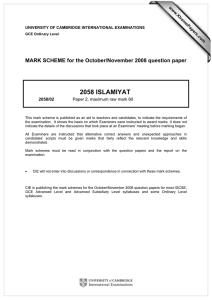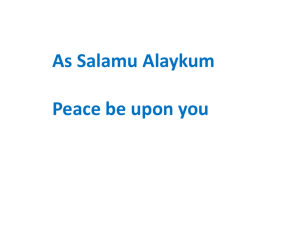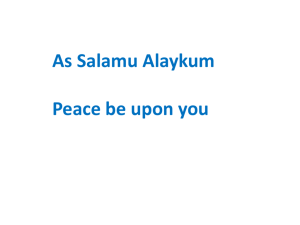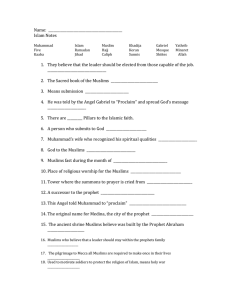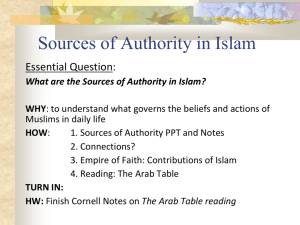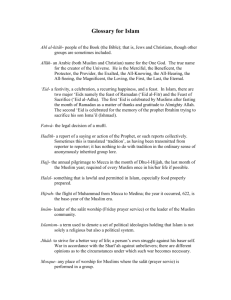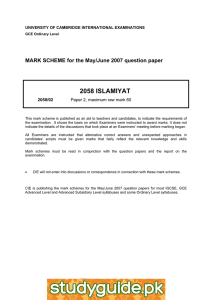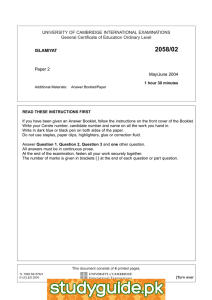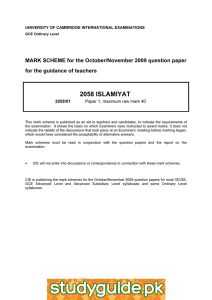2058 ISLAMIYAT MARK SCHEME for the October/November 2008 question paper
advertisement
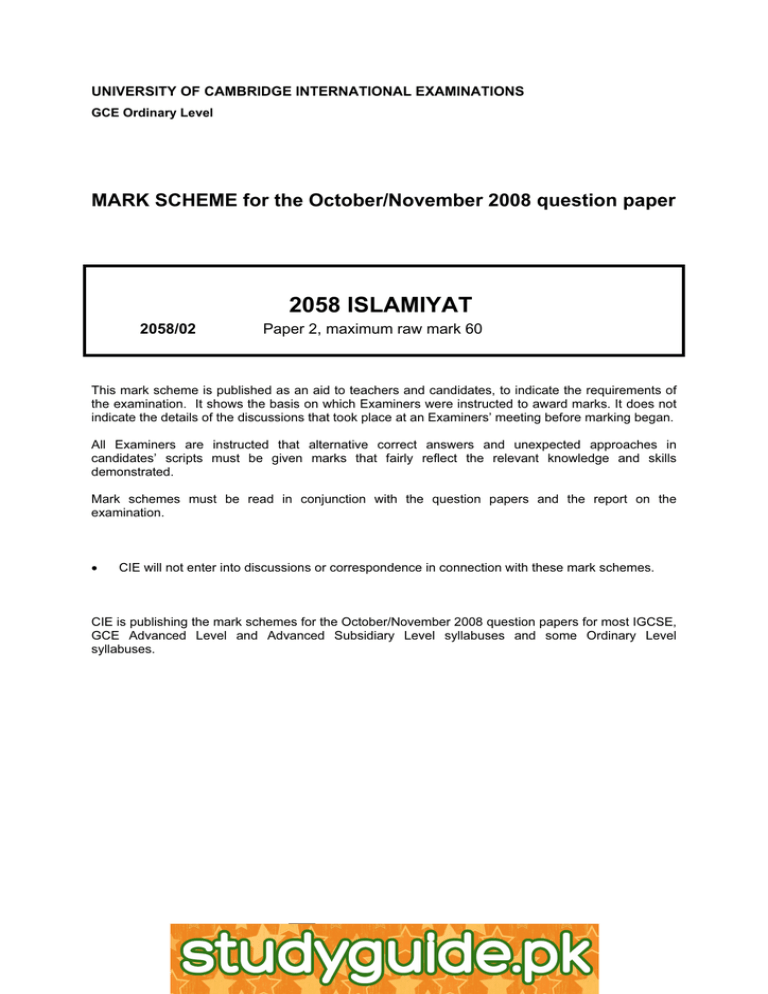
UNIVERSITY OF CAMBRIDGE INTERNATIONAL EXAMINATIONS GCE Ordinary Level MARK SCHEME for the October/November 2008 question paper 2058 ISLAMIYAT 2058/02 Paper 2, maximum raw mark 60 This mark scheme is published as an aid to teachers and candidates, to indicate the requirements of the examination. It shows the basis on which Examiners were instructed to award marks. It does not indicate the details of the discussions that took place at an Examiners’ meeting before marking began. All Examiners are instructed that alternative correct answers and unexpected approaches in candidates’ scripts must be given marks that fairly reflect the relevant knowledge and skills demonstrated. Mark schemes must be read in conjunction with the question papers and the report on the examination. • CIE will not enter into discussions or correspondence in connection with these mark schemes. CIE is publishing the mark schemes for the October/November 2008 question papers for most IGCSE, GCE Advanced Level and Advanced Subsidiary Level syllabuses and some Ordinary Level syllabuses. www.xtremepapers.net Page 2 1 Mark Scheme GCE O LEVEL – October/November 2008 Syllabus 2058 Paper 02 Comment on the meaning and importance of any seven of the words or phrases underlined in the following passages. [14] (a) Sura 1 In the name of God, most gracious, most merciful.1 Praise be to God, the Lord of the worlds,2 Most gracious, most merciful, Master of the day of judgement.3 You do we worship, and your aid we seek.4 Show us the straight way,5 The way of those on whom you have bestowed your grace, Those whose portion is not wrath, And those who go not astray. 1. In the name of God, most gracious, most merciful • This phrase gives valuable insights into God’s nature. • The repetition of al-Rahman and al-Rahim emphasizes the merciful character of his nature. • This is recited whenever a Muslim begins an action. 2. Lord of the Worlds • God is Lord of all that exists. • He is Lord of this world and the world to come. • Everything is under God’s control. 3. Master of the day of judgement • On judgement day God will decide between the righteous and unrighteous • For he alone is Master of that day. 4. Your aid we seek • Muslims should always turn to God for help. • They should seek his help before any other source. • God can help us because he is the Creator of all. 5. The straight way • This is the path, based on the Qur’an, that all Muslims should follow. • It is the path followed by Abraham and earlier believers in one God. © UCLES 2008 www.xtremepapers.net Page 3 Mark Scheme GCE O LEVEL – October/November 2008 Syllabus 2058 Paper 02 (b) Sura 8.44-5 And remember when you met,6 he showed them to you as few in your eyes, and made you appear as contemptible in their eyes;7 so that God might accomplish a matter already enacted. For to God all matters go back. O you who believe! When you meet a force, Be firm, and remember God much, so that you may prosper.8 6. And remember when you met • This refers to the battle of Badr. • The mention of it in the Qur’an shows that it was part of God’s plan. 7. and made you appear as contemptible in their eyes • The Muslim force at Badr was made to appear as insignificant. • God performed this miracle in order to make the Makkans overconfident. 8. remember God much, so that you may prosper • In the Battle of Badr the Muslims won by depending on God. • All Muslims should follow this example and they will prosper against any odds. (c) Sura 114 Say: I seek refuge with the Lord of mankind,9 The King of mankind, The God of mankind, From the evil of the whisperer who withdraws,10 Who whispers in the hearts of mankind, Among jinn and mankind. 9. I seek refuge with the Lord of mankind • God is the proper refuge from danger and evil. • He is the Lord of all and can help those who turn to him. 10. the whisperer who withdraws • This is often understood as Satan, or other people. • These individuals put bad thoughts in people’s minds almost without their noticing. © UCLES 2008 www.xtremepapers.net Page 4 2 Mark Scheme GCE O LEVEL – October/November 2008 Syllabus 2058 Paper 02 Comment on the teachings in seven of the following Hadiths about what Muslims should believe and how they should act. [14] (a) Actions are judged by intentions. • A person’s action depends on what is meant behind it. • He should be judged by what he intended rather than what he did. (b) A Muslim is one from whose tongue and hand Muslims are safe. • Muslims believe they can trust and rely on other Muslims. • Muslims should show loyalty to others in both words and deeds. (c) Each of you is a custodian, and each of you will be held responsible for those in your care. • Muslims believe they should care for those around them. • Believers should look after those for whose welfare they are accountable. (d) One who cheats is not among us. • Cheating involves treating others unfairly. • People who do this cannot be part of the believing community. (e) The best among you is the one who has learnt the Qur’an and teaches it. • It is important to believe that the teachings of the Qur’an are central to life. • Learning and sharing these teachings is important [both elements for a mark]. (f) To obtain knowledge is obligatory for Muslim men and women. • Muslims must always be ready to learn. • Education is open to women and men equally. (g) For whoever asks blessings on me once God will open a door of safety. • Muslims should always remember the importance of the Prophet in their belief. • They should pray for him to God. (h) Sincerity leads to godliness, and godliness leads to paradise. • God rewards people who are sincere. • Acting in a way that people can trust increases a Muslim’s faith. (i) Purity is half of faith. • Purity of attitude is a large part of Muslim beliefs. • Purity in actions towards others is a sign of being a Muslim/physical cleanliness is important at all times in Islam. (j) Not one of you believes until he desires for his brother what he desires for himself. • Concern for the welfare of others is an important part of faith. • Acting with care for others is a sign of sincere belief. © UCLES 2008 www.xtremepapers.net Page 5 3 Mark Scheme GCE O LEVEL – October/November 2008 Syllabus 2058 Paper 02 (a) Describe the teachings of Islam about the position of women as (i) wives, [4] • Wives are equal to their husbands. • They are partners with their husbands in family life. • They have financial independence. • The have a right to financial support. • They are primarily responsible for the home. • They have a right to divorce. • [1 mark for use of quotations from the Qur'an and examples from the life of the Prophet, as long as they are used to support points] (ii) mothers, [4] • They have the main responsibility for bringing up children. • They are the first teachers of faith and proper conduct. • They deserve respect from their children because of what they have done for them. • [1 mark for use of more than one quotations from the Qur'an and examples from the life of the Prophet, as long as they are used to support points.] (iii) daughters. [3] • Daughters should be cared for as carefully as sons. • They should always be allowed freedom in choices. • They have a right to their parents’ legacy. • Daughters have as much right to an education as sons. • [1 mark for use of one or more examples from the Qur’an and the life of the Prophet, as long as they are used to support points.] (b) Explain the teachings of Islam about the relationship between men and women. [5] • Men and women should be respectful in one another's presence. • They should be modest in one another's presence. • Unmarried men and women should not be alone together. • unless they are close relatives. • In marriage men and women should cooperate as partners. • While husbands take initiatives in the marriage partnership, they should consult their wives' interests. 4 (a) Describe the main activities of 'Ali during the lifetime of the Prophet. [6] • He was brought up in the Prophet’s house. • He was among the first converts to Islam/the first child to become a Muslim. • He lay in the Prophet’s bed on the night of the hijra/He was entrusted by the Prophet to return the belongings of the Makkans. • He married the Prophet’s daughter Fatima. • He fought in single combat before the battle of Badr. • He fought fiercely during the capture of Khaybar. • He wrote down the text of the Treaty of Hudaybiya. • During the Tabuk expedition Ali was the Prophet’s deputy in Madina and did not participate in the battle. © UCLES 2008 www.xtremepapers.net Page 6 Mark Scheme GCE O LEVEL – October/November 2008 Syllabus 2058 Paper 02 (b) Describe the main events of 'Ali’s rule as caliph. • He was confronted with the decision of how to treat the assassins of 'Uthman. • Talha and Zubayr, with the support of 'A’isha, opposed him. • He defeated them at the battle of the Camel. • Mu'awiya refused to give him allegiance or vacate his position as Governor of Syria. • The armies led by the two met at Siffin. • The battle proved indecisive. • 'Ali agreed to arbitration. • Some of his supporters deserted him. [6] (c) Explain why close Companions of the Prophet opposed 'Ali, and why his supporters deserted him towards the end of his life. [2 × 2] • Talha and Zubayr thought he should punish 'Uthman’s assassins as soon as possible. • This was the just action and they thought `Ali was wrong not to do it. • 'Ali’s supporters at Siffin thought he was the leader of the community and those who opposed him were wrong. • So they thought he was wrong to arbitrate with sinners. 5 Explain the importance of the following during the lifetime of the Prophet: (a) Abu Talib, [4] • He brought the Prophet up after his grandfather’s death. • He trained him as a merchant. • He protected him against his enemies in Makka. • As head of the Prophet’s clan he had the power to do this. • He supported the Prophet during the boycott and allowed the Muslims to stay at his gorge. (b) Bilal, • He was a slave who became one of the first Muslims. • He was tortured mercilessly but never gave up his faith. • This showed the depth of his loyalty to Islam. • He was appointed as the first muezzin in Islam. • This shows the equality of all believers according to Islamic teachings. [4] (c) Abu Sufyan, • He was a merchant and one of the leaders of Makka. • He became one of the Prophet’s main opponents. • He was involved/participated in the main battles against the Muslims of Madina. • After much resistance to the Prophet he finally became a Muslim. • This was a sign that Islam had triumphed over the people of Makka. • The Prophet designated his house as a place of refuge at the capture of Makka. [4] (d) the Ansar. • They were people of Madina who accepted Islam • They helped the Muslim emigrants (muhajirun) when they came north • They shared their possessions with them/took them as brothers • Their help enabled Islam to become established in the community of Madina [4] © UCLES 2008 www.xtremepapers.net


